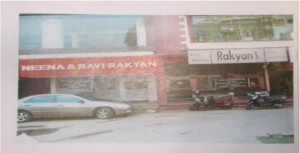 The Supreme Court recently had the opportunity to adjudicate upon a case related to S.35 of the Trademarks Act. The case was between two separate firms consisting of members from the same family, sharing the same surname – ‘Rakyan’. These firms were each engaged in the business of selling jewellery and precious stones which was also a family business and there were other family firms that were also involved in the same business. The parties’ shops were also “abutting” each other. The plaintiffs in the original suit contended that they had a trademark over the phrase ‘Rakyan’ and therefore sought an injunction to restrain the defendants from using the same for their shop. The High Court on considering this plea, granted an interlocutory order restraining them from using the phrase.
The Supreme Court recently had the opportunity to adjudicate upon a case related to S.35 of the Trademarks Act. The case was between two separate firms consisting of members from the same family, sharing the same surname – ‘Rakyan’. These firms were each engaged in the business of selling jewellery and precious stones which was also a family business and there were other family firms that were also involved in the same business. The parties’ shops were also “abutting” each other. The plaintiffs in the original suit contended that they had a trademark over the phrase ‘Rakyan’ and therefore sought an injunction to restrain the defendants from using the same for their shop. The High Court on considering this plea, granted an interlocutory order restraining them from using the phrase.
The appellants (original defendants) argue that the order of the High Court should be set aside, as they could avail of the defence of S.35 of the Trademarks Act, 1999. S.35 of the Trademarks Act states that, “[N]othing in this Act shall entitle the proprietor or a registered user of a registered trade mark to interfere with any bona fide use by a person of his own name or that of his place of business, or of the name, or of the name of the place of business, of any of his predecessors in business, or the use by any person of any bona fide description of the character or quality of his goods or services.” They argue that both the proprietors of their firm had a common surname – “Rakyan” which they were using for their products and therefore the defence under S.35 would clearly apply.
The court in its ruling did not venture much reasoning but held that the defence of S.35 was indeed available to the appellants and therefore the order of the High Court was quashed and set aside. The court also comments stating that it noted no similarities between the hoardings of the two parties.
Why this judgement is interesting to consider is because although it is merely dealing with an interlocutory order, the views of the Delhi High Court in the case of Goenka Institute of Education v. Anjani Kumar Goenka find no mention. Here the court had observed that, “the defence under Section 35 will only apply to a full name and that also by a natural person and not by a legal entity which can choose a separate name.” The Delhi High Court here had cited with approval, a portion from the decision of Dr. Reddy’s Laboratories Ltd. v. Reddy Pharmaceuticals Ltd. which talks about the necessity of such a position – that it would lead to individuals having the same surname as that of another individual whose name had acquired distinctiveness in association with a product or service, opening up competing businesses and cashing in on the goodwill of the former. Perhaps the fact that this was merely a partnership firm, affected the reasoning the court, however, with no reasoning provided as to why this position was adopted, I can only speculate. Interestingly in a Delhi High Court proceeding between the parties, the court, in considering a S.35 defence held that the entire section hinged on the phrase “bona fide” and the bona fide intent of the respondents (in that case as well as in this) was not demonstrated and they were prevented from using the mark. It will be interesting to observe how the Delhi High Court finally resolves this controversy.
